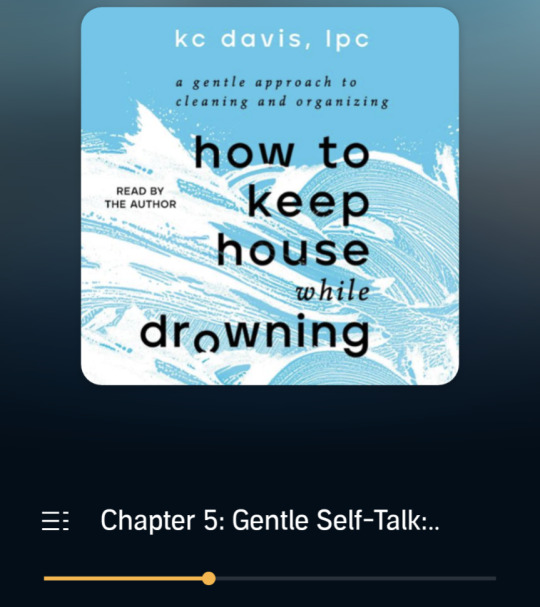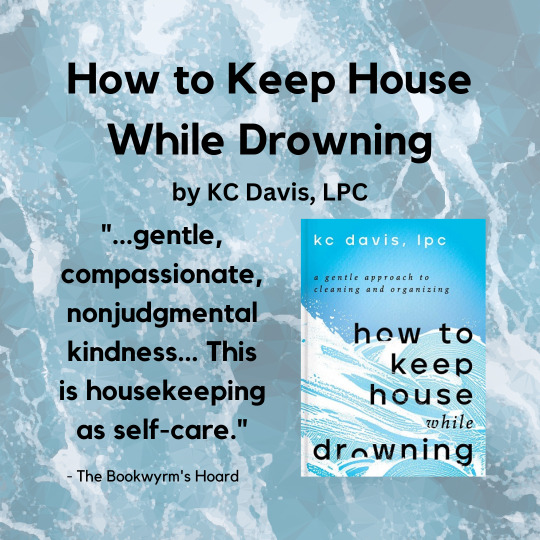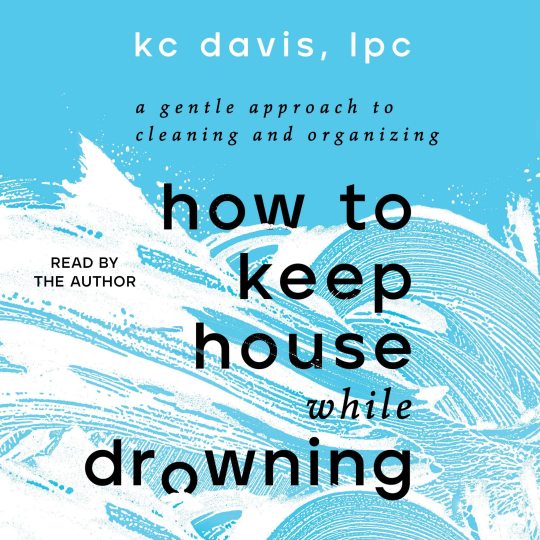#kc davis
Text
If the right way is too hard, fuck it. Do it the wrong way.
Folding clothes keeps you from getting the laundry done? Stop folding clothes. Put a basket in your room and throw your unfolded clean stuff into it right out of the dryer, it's fine.
Rinsing dishes off keeps you from loading the dishwasher? Load them dirty and run it twice.
Chopping onions keeps you from making yourself dinner? Buy the freezer bags of chopped onions.
You forget to take your meds and don't want to get out of bed to get them? Start putting them next to the bed.
Can't keep up with the dishes? Get paper plates. Worried about environment impact? Order biodegradable ones online if your local store doesn't have one.
Make the task easier. Put things where you use them instead of where they "go." Eliminate the steps that keep you from finishing the task. Eliminate the task that is stressing you out.
Do it the "wrong" way. It's literally fine.
#credit to#kc davis#for literally saving my life with this advice#struggle care#self care#life advice
42K notes
·
View notes
Text
This just really clicked with me. And today I tidied my living room!
60 notes
·
View notes
Text
How to Keep House While Drowning by KC Davis.

Wow! Here is a book less than 3 hours on audiobook about how to keep your home and life functional during the hardest of times, and because of this book, I had plenty to reflect on in therapy.
Let's back up: How to Keep House While Drowning by KC Davis shares tips on getting care tasks done such as cleaning your home and yourself. But it’s also about how to let go of the moralizing and shame about these tasks. KC Davis says many times that care tasks are morally neutral. The tips are really helpful to those of us who are disabled, chronically fatigued and chronically in pain, especially how to prioritize the important stuff like dealing with trash and taking our medicine. But the suggestions are helpful to anyone, whether they are stressed, overworked, raising kids, etc.
I think the real gems of the book are where she gets the reader to reflect on possible shame and even trauma around these tasks. Whether your parents shamed you around cleaning or you grew up in neglect or you experienced other forms of toxicity around care tasks, this book is for you.
I had a moment where I just said " oh" as I realized that's why I can’t clean the bathroom, especially the toilet. It’s a trigger for me. Now that I know, I have no problem asking my spouse to be in charge of toilets.
The book also talks about how guilt around environmentalism impedes disabled people taking care of themselves and their spaces. It talks about how to create equal rest time in the household and other tools to have a functional life and house. I honestly knew this would be a 5 star read when I heard her say, "Throw it away." And it just got better from that point on. This book is for everyone: 5 stars!
#book review#How to keep house#KC Davis#NonFiction#Cleaning#Care Tasks#disabled life#neurodivergent#Disabled writers#Neurodivergent writers
8 notes
·
View notes
Text
You do not have to earn the right to rest, connect, or recreate. Unlearn the idea that care tasks must be totally complete before you can sit down. - How to Keep House While Drowning by K.C. Davis
#How to Keep House While Drowning#KC Davis#books and libraries#bookworm#books & libraries#book quotes#quotes#quote#booklr#book blog#bookblr#bookish#books#book#self help#self care#adhd#commonplace journal#commonplace book#nonfiction
8 notes
·
View notes
Text
An Ode to Baskets

Big baskets, little baskets, clear baskets, wicker baskets, baskets
from the Dollar Tree, baskets that I got for free.
Baskets of shoes, baskets of books, baskets in all my crannies and
nooks.
And here’s the key, here’s the trick:
the baskets go where the stuff already went.
Laundry that ends up on the dining room floor,
put a basket there and there’s mess no more.
The stress of a cluttered counter easily ends
when you put it all in a box or a bin.
If you’re feeling fancy you could purchase a basket’s cousin
such as a tray or a lazy Susan.
My organizational system is, on its face,
just putting a basket in the right place
-KC Davis, How To Keep House While Drowning
3 notes
·
View notes
Text
CARE TASKS ARE MORALLY NEUTRAL.
If you are not mentally able do a “simple” task (cook, clean, eat), that doesn’t make you a failure. Find a work around and tackle the problem later.
youtube
#quotes#life quotes#life advice#life hacks#youtube#ted talks#KC Davis#How to Do Laundry When You’re Depressed#depression#anxiety#adhd
17 notes
·
View notes
Text
Although men may struggle with completing care tasks, they are less likely to receive the message from society that they are not worthy of love or not valid as a human if they are not good at these tasks.
How to Keep House While Drowning by KC Davis
2 notes
·
View notes
Photo

How to Keep House While Drowning, by KC Davis
KC Davis's approach to housekeeping is one of gentle, compassionate, nonjudgmental kindness and understanding — an attitude she both displays to her readers and recommends they take towards themselves. This is housekeeping as self-care, with a deep appreciation of the physical, mental, emotional, and circumstantial barriers that can stand in the way.* Rather than prescribe rigid routines or impose strict standards that many of us find it impossible to meet, Davis offers both encouragement and permission to design a home, organizational systems, and rhythms/routines that fit your needs and abilities.
I came away from the book with several insights into why I struggle with what some of what Davis calls "care tasks." I also identified several practical and attitudinal steps I can take to make things easier, and to be kinder to myself in the process (rather than shaming and berating myself for not being "perfect.")
*Disabilities, chronic illness, ADHD, depression, anxiety, trauma, grief, and challenging life circumstances are just a few examples of things that can make it difficult to maintain a functional home. Davis’s approach is very focused on making your home, and your housekeeping, function for you, where you are.
NOTE: The author speaks from personal experience as well as her expertise as a therapist. She has ADHD and has suffered from severe postpartum depression. She is on TikTock (@domesticblisters) and Instagram and Facebook (@strugglecare), and started the Struggle Care podcast in 2022.
#book review#how to keep house while drowning#kc davis#strugglecare#housekeeping#adhd#chronic illness
7 notes
·
View notes
Quote
Thank you for your concern, but I'm not taking any feedback on this issue right now.
shutting down negative talk from How to Keep House While Drowning: A Gentle Approach to Cleaning and Organizing by KC Davis, LPC
13 notes
·
View notes
Text
I truly cannot overstate how much it changed my life to learn that "cleaning," tidying," decluttering," and "organizing" are four completely separate tasks that cannot be done effectively at the same time. Or that if you do want to do them all, there's an order that generally works best. And also that "spotless" is sometimes less useful a goal than "functional."
I used to struggle SO MUCH with keeping my space neat and clean. This massive task would just loom in front of me and my off-kilter little brain would say Nope! Not today. So it would get bigger and bigger and more insurmountable until finally I would have a breakdown about it. And then I would spend hours or days trying to declutter, organize, tidy, and clean all at the same time until I was exhausted and could feel myself heading into a migraine or an R.A flare-up, or both. And it never felt like I really got fully done.
But just now I looked at my living room, which was a disaster area after a week of frantic Halloween costume making activity, and sighed, and tidied that plus my kitchen in less than half an hour. And I still had the energy to go get the mail, go fetch the dish I forgot at the party last night, ckean out my fridge, take out the trash, AND make myself food! And I'm not on the verge of a breakdown or flaring or fighting off a migraine! All because I didn't turn one task into four, because someone FINALLY taught me HOW to keep house instead of just insisting I do it or else I'm disgusting and irresponsible.
Anyway this is like a daily revelation for me, that I CAN keep my house a functional and healthy space for me, even as someone dealing with brain issues, chronic pain, allergies, and at times limited mobility. And that when I can't, it doesn't make me a bad person or disgusting. If you're struggling with any of this, I highly recommend looking into KC Davis's Struggle Care. She's on tiktok as domesticblisters and on instagram as strugglecare. She also has a podcast called Struggle Care, and between the three of these platforms there are TONS of free resources and judgment-free advice for anyone who has trouble keeping their space functional when they're struggling.
#struggle care#you can also support her by purchasing her book or any of her paid resources#her podcast has healed wounds i didn't even know i still had open#domesticblisters#kc davis#resources#cleaning#tidying#decluttering#organizing
63 notes
·
View notes
Photo

Finished: 18/02/2023
How to Keep House While Drowning by KC Davis
Quit beating yourself up for having a skill deficit when what you really have is a support deficit. Self-care was never meant to be a replacement for community care. Striving to “be better” will exhaust the little energy you have, and it’s probably time better spent letting yourself cry and sleep and finding small pockets of joy to keep you going.
Rating: ★★★★★
Summary:
Designed for neurodivergent people and those struggling with mental illness, therapist KC Davis provides tips, tricks, and compassionate messaging, to help you take care of yourself and your home when it feels impossible.
Review:
The best kind of book is one that makes you see things within yourself that you never even knew were there, and How to Keep House While Drowning, fit that description to a tee. Most of the practical solutions Davis introduced to cleaning were either not applicable to myself or things that I was already doing. In terms of cleaning and organization hacks this book really was not it for me, but what was it for me was the ways that Davis talked about cleaning. I didn’t know that I needed to be told that cleaning (or not cleaning) is not a moral activity, and that I’m not a bad person for having a messy home or being incapable of caring for myself sometimes. I didn’t realize how much of my cleaning habits were wrapped up in shame, embarrassment, and disgust towards myself. I cried listening to this audiobook, as I scrubbed the grout between the tiles of my shower, and KC Davis told me that, “[I] deserve kindness and love regardless of how good I am at care tasks.” I didn’t know how much of my self worth was tied to my fucked-up ideas about the cleanliness of my home and my own body, but now that I do maybe I can start to unravel them and be a freer, less burnt out, version of myself. I haven’t read many self-help books, mostly because I find them preachy and borderline accusatory, but How to Keep House While Drowning, might even be deserving of a reread for how much I felt legitimately seen and understood.
4 notes
·
View notes
Text
Decision Fatigue
I was talking to a friend a while ago about how I like to watch a YouTube channel called Rover's Makeover Dog Grooming. I love to see the animals go from matted and dirty to clean. It's like they have a new lease on life.
I also enjoy watching a channel about a lady who specializes in unmatting people's hair. That channel is called Life 518.
People usually question why or how someone could possibly let themselves get that way or let their pet get that way.
Well, it is actually quite simple how it happens.
It's called depression. It's called anxiety. It's called ADHD. It's called a lot of different things but it is something that millions of people experience.
How does this happen?
It starts so easily. It starts when you don't brush your teeth because you're tired. And then you don't brush your hair because you're tired. You meant to have a shower five hours ago but you just sort of stared at the wall for a while and lost track of time. So you'll do it tomorrow, you tell yourself.
The dishes didn't get done last night because I was tired. That's okay, I'll do them tomorrow after the laundry. The laundry is going to take all night though and I need to go to bed early because I have that project tomorrow.
Before long, the days of letting things go start to show and now instead of the 30 minutes to clean the bathroom, it's going to take 3 hours. And where do you even start now? Do you just do an hour? Then move on to something else? You're running the scenario in your head. Can you do all of the laundry and also the dishes? What happens if you can't get the dishes done tonight and then there will be even more tomorrow.
The shame as crept in by now. You can't have anyone come over. You have to be sure to crop pictures a specific way so that no one can see. You blurr the background on your Teams calls.
And it keeps going.
One day you look around and that voice in your head tells you that you're lazy. That voice says that you're a disgusting pig. That voice tells you that no one else lives like this. That voice says it's all your fault. If only you were just a better person.
This Ted Talk video describes it so well.
I don't think we should be so quick to judge people who look a mess or the people who don't look a mess. The hardest thing they might have done that day was get out of bed.
youtube
#depression#ted talk#how to do laundry when you're depressed#KC Davis#struggle care#just hanging in there#Youtube
5 notes
·
View notes
Text
youtube
1 note
·
View note
Text
The best way to do something is the way it gets done. - How to Keep House While Drowning by K.C. Davis
(January 2023)
#How to Keep House While Drowning#KC Davis#books and libraries#bookworm#books & libraries#book quotes#quotes#quote#booklr#book blog#bookblr#bookish#books#book#self help#self care#adhd#commonplace journal#commonplace book#nonfiction
6 notes
·
View notes
Text
You know, my Mom was a stay at home mom for my childhood, but she never "played with" us. Heck, we would have been SUPER ANNOYED if she'd tried to come into our games! 😂 Same for my Dad. They read to us, showed us how to do stuff, talked with us, etc. But play was our kid business! No adults allowed!
0 notes
Text
In situations where we are victimized, having boundaries means that I assign the blame to that behaviour to the person it actually belongs to. I could not have controlled their behaviour and so I will not wear the shame of that behaviour. For example, the shame of rape belongs to a rapist — I will not wear that guilt. The guilt of abuse belongs to the abuser. I will not take responsibility for being victimized — the responsibility belongs to the victimizer. An abuser can violate our bodies, our trust, our autonomy, even our dignity. It’s a deep wound that deserves grief and substantial support.
But the one thing an abuser cannot do, no matter how hard they try to deny it, or try to convince you of it, they cannot assign you their guilt. They cannot require that you wear their shame. They cannot transfer the responsibility of that violation to you. It remains with them until they settle up with their maker. To this fact you have two choices: you might whisper under your breath, “may God have mercy on their soul”, or you can scream from the mountain, “fuck their soul, I hope if there is a God he bathes in their blood” — either response is permissible.
You are not responsible to your abuser for forgiveness. Your only responsibility is to yourself; to heal; to find peace. Sometimes forgiveness brings that, but only when it’s chosen and never when it’s obligated. Plenty of people find peace without forgiveness.
— KC Davis, unpublished
1 note
·
View note